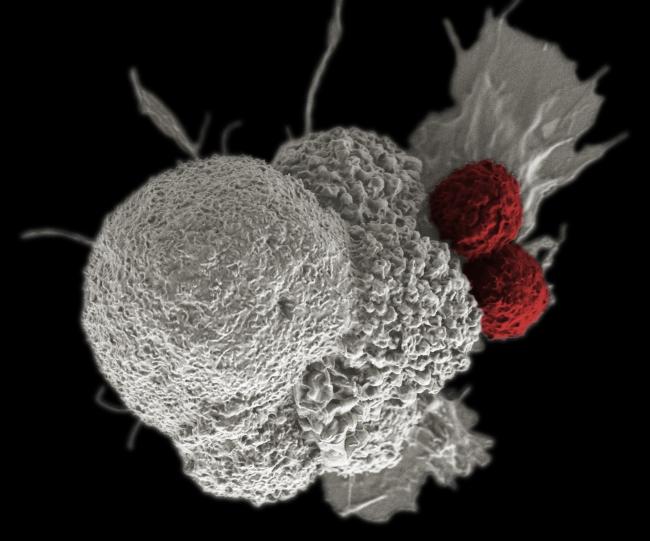Identifying immune cells for personalized cancer immunotherapy
February 15, 2022
Identifying immune cells for personalized cancer immunotherapy
At a Glance
- A new technique identified rare immune cells found in patients’ tumors that can recognize and potentially kill cancer cells.
- The approach could help advance the development and effectiveness of personalized cancer immunotherapies.

A type of cancer immunotherapy called adoptive cell transfer (ACT) holds the promise of truly personalized treatment. In ACT, immune cells that can recognize and kill cancer cells are isolated from the body. Those cells are then altered, or simply grown as-is in large numbers, and infused back into the bloodstream.
Some types of ACT are now being used in the clinic to treat blood cancers like leukemia. For a minority of people, they can provide long-term remission and even a cure. But they don’t work in all patients. And they’ve shown only sporadic effectiveness in solid tumors, which account for 90% of deaths from cancer.
Researchers are searching for ways to better identify the immune cells that could be harnessed for ACT. Much work has focused on tumor-infiltrating lymphocytes (TILs). These are immune cells—often T cells—that have already made their way into a tumor.
TILs often become exhausted from repeated exposure to cancer cells in the tumor environment. But some likely recognize cancer cells and have the potential to kill them. Finding these cells has required them to be isolated and individually tested in the lab.
A research team led by Dr. Steven Rosenberg from NIH’s National Cancer Institute (NCI) has been searching for ways to identify TILs for ACT more quickly and efficiently. In a new study, they examined gene-expression profiles—which genes are turned on and off—from single T cells taken from different types of solid tumors, including breast cancer, colon cancer, and melanoma. They then asked whether these profiles could be used to find the rare immune cells that recognize the mutated proteins found on cancer cells, called neoantigens. Results were published on February 3, 2022, in Science.
The team identified gene-expression signatures in immune cells across different tumor types. They then looked at whether these signatures could predict which T cells recognize tumor neoantigens. Comparing them to the gene-expression patterns of T cells known to recognize tumor cells, they found that two of the signatures were particularly likely to correspond to a cancer-cell killing T cell.
They next determined whether these signatures could be used to identify cancer-reactive TILs in samples from four independent colon tumors. About half of the cells identified by the signatures as likely to recognize tumor cells did so upon further testing. The researchers also confirmed the ability of their signatures to pick immune cells that identify neoantigens in an additional set of archived tumor samples.
“These signatures may allow us to find the best cancer-fighting T cells without the need for exhaustive laboratory testing,” Rosenberg says. “Such techniques could help advance the development and effectiveness of personalized cancer immunotherapies for patients whose cancers do not respond to standard treatments.”
These signatures would need to be tested in future clinical trials of ACT. A better understanding of the cell functions directed by the gene-expression signatures could also help advance cancer treatments.
Related Links
- Fiber in Diet Linked to Cancer Immunotherapy Response
- Predicting Response to Immunotherapy
- Biomarker Predicts Benefit from Immunotherapy
- Breast Cancer Patient Benefits from Modified Immunotherapy
- Personalized Immunotherapy Treats Epithelial Cancer
- Immunotherapy to Treat Cancer
- T-cell Transfer Therapy
- CAR T Cells: Engineering Patients’ Immune Cells to Treat Their Cancers
References
Molecular signatures of antitumor neoantigen-reactive T cells from metastatic human cancers. Lowery FJ, Krishna S, Yossef R, Parikh NB, Chatani PD, Zacharakis N, Parkhurst MR, Levin N, Sindiri S, Sachs A, Hitscherich KJ, Yu Z, Vale NR, Lu YC, Zheng Z, Jia L, Gartner JJ, Hill VK, Copeland AR, Nah SK, Masi RV, Gasmi B, Kivitz S, Paria BC, Florentin M, Kim SP, Hanada KI, Li YF, Ngo LT, Ray S, Shindorf ML, Levi ST, Shepherd R, Toy C, Parikh AY, Prickett TD, Kelly MC, Beyer R, Goff SL, Yang JC, Robbins PF, Rosenberg SA. Science. 2022 Feb 3:eabl5447. doi: 10.1126/science.abl5447. Online ahead of print. PMID: 35113651.
Funding
NIH’s National Cancer Institute (NCI).


